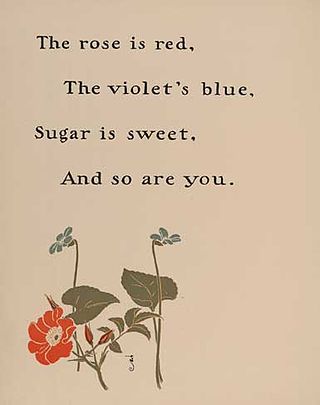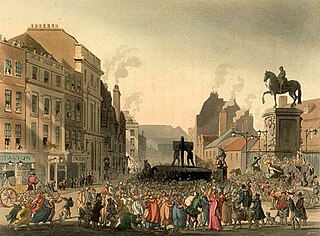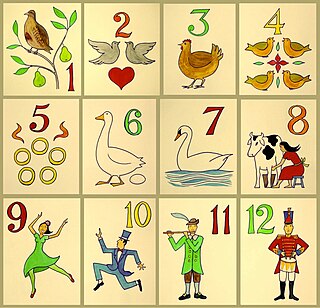Related Research Articles

Natalie Anne Merchant is an American singer-songwriter. She joined the band 10,000 Maniacs in 1981 and was lead vocalist and primary lyricist for the group. She remained with the group for their first seven albums before leaving to begin her solo career in 1993. She has since released nine studio albums as a solo artist.
"Hush, Little Baby" is a traditional lullaby, thought to have been written in the Southern United States. The lyrics are from the point of view of a parent trying to appease an upset child by promising to give them a gift. Sensing the child's apprehension, the parent has planned a series of contingencies in case their gifts don't work out. The simple structure allows more verses to be added ad lib. It has a Roud number of 470.

"Oranges and Lemons" is a traditional English nursery rhyme, folksong, and singing game which refers to the bells of several churches, all within or close to the City of London. It is listed in the Roud Folk Song Index as No 13190. The earliest known printed version appeared c. 1744.

"Pat-a-cake, pat-a-cake, baker's man", "Pat-a-Cake", "Patty-cake" or "Pattycake" is an English nursery rhyme. It has a Roud Folk Song Index number of 6486.
"Christmas Is Coming" is a traditional nursery rhyme and Christmas song frequently sung as a round. It is listed as number 12817 in the Roud Folk Song Index.

"Roses Are Red" is the name of a love poem and children's rhyme with Roud Folk Song Index number 19798. It has become a cliché for Valentine's Day, and has spawned multiple humorous and parodic variants.
"Tinker, Tailor" is a counting game, nursery rhyme and fortune telling song traditionally played in England, that can be used to count cherry stones, buttons, daisy petals and other items. It has a Roud Folk Song Index number of 802. It is commonly used by children in both Britain and America for "counting out", e.g. for choosing who shall be "It" in a game of tag.
"The Unquiet Grave" is an Irish / English folk song in which a young man's grief over the death of his true love is so deep that it disturbs her eternal sleep. It was collected in 1868 by Francis James Child as Child Ballad number 78. One of the more common tunes used for the ballad is the same as that used for the English ballad "Dives and Lazarus" and the Irish pub favorite "Star of the County Down".

"There Was a Crooked Man" is an English nursery rhyme. It has a Roud Folk Song Index number of 1826.

"As I was going by Charing Cross", is an English language nursery rhyme. The rhyme was first recorded in the 1840s, but it may have older origins in street cries and verse of the seventeenth century. It refers to the equestrian statue of King Charles I in Charing Cross, London, and may allude to his death or be a puritan satire on royalist reactions to his execution. It was not recorded in its modern form until the mid-nineteenth century. It has a Roud Folk Song Index number of 20564.
"Old MacDonald Had a Farm" is a traditional children's song and nursery rhyme about a farmer and the various animals he keeps. Each verse of the song changes the name of the animal and its respective noise. For example, if the verse uses a cow as the animal, then "moo" would be used as the animal's sound. In many versions, the song is cumulative, with the animal sounds from all the earlier verses added to each subsequent verse.

James Gideon "Gid" Tanner was an American old-time fiddler and one of the earliest stars of what would come to be known as country music. His band, the Skillet Lickers, was one of the most innovative and influential string bands of the 1920s and 1930s. Its most notable members were Clayton McMichen, Dan Hornsby (vocals), Riley Puckett and Robert Lee Sweat (guitar).
The Bonnie Lass o' Fyvie is a Scottish folk song about a thwarted romance between a soldier and a woman. Like many folk songs, the authorship is unattributed, there is no strict version of the lyrics, and it is often referred to by its opening line "There once was a troop o' Irish dragoons". The song is also known by a variety of other names, the most common of them being "Peggy-O", "Fennario", and "The Maid of Fife".
"King Henry" is an English-language folk song. It is a version of the tale of the loathly lady. This form of the tale appears in Hrólfr Kraki's saga and also in the Scottish tale "The Daughter Of King Under-Waves". A similar bride is found in "The Marriage of Sir Gawain".
"Seventeen Come Sunday", also known as "As I Roved Out", is an English folk song which was arranged by Percy Grainger for choir and brass accompaniment in 1912 and used in the first movement of Ralph Vaughan Williams' English Folk Song Suite in 1923. The words were first published between 1838 and 1845.

"The Twelve Days of Christmas" is an English Christmas carol. A classic example of a cumulative song, the lyrics detail a series of increasingly numerous gifts given to the speaker by their "true love" on each of the twelve days of Christmas. The carol, whose words were first published in England in the late eighteenth century, has a Roud Folk Song Index number of 68. A large number of different melodies have been associated with the song, of which the best known is derived from a 1909 arrangement of a traditional folk melody by English composer Frederic Austin.
"Dashing Away with the Smoothing Iron" is an English folk song about a man admiring the woman he loves as she goes through daily stages of washing and ironing clothes. It is classified as Roud number 869. The earliest date in the Vaughan Williams catalogue is 1904, as collected in Somerset and arranged by Cecil Sharp. A later entry for 1908 gives the source as Jane Gulliford from Somerset. The Fresno State University gives a slightly different title, "Driving Away at the Smoothing Iron", with a date of 1909.

'I Had a Little Nut Tree' is an English language nursery rhyme. It has a Roud Folk Song Index number of 3749.The song mentions a visit by the daughter of the King of Spain to request nutmeg and a pear. James Orchard Halliwell suggested that the song commemorates the 1506 visit of the Queen regnant Joanna of Castile to the English court of her brother-in-law, Henry VII. However, the oldest known version of the song dates to 1797.

Leave Your Sleep is the fifth studio album by American singer-songwriter Natalie Merchant. Produced by Merchant and Andres Levin, the double concept album is "a project about childhood" and is a collection of music adapted from 19th and 20th century British and American poetry about childhood. BBC Music describes it as "200 years of lyrical and musical history, washing beautifully by."
"Cripple Creek" is an Appalachian-style old time tune and folk song, often played on the fiddle or banjo, listed as number 3434 in the Roud Folk Song Index.
References
- ↑ Waltz, Robert. "Soldier, Soldier, Will You Marry Me?". fresnostate University. The Ballad Index. Retrieved 27 October 2022.
- ↑ Vaughan Williams, Ralph. "Soldier Soldier Will You Marry Me". Vaughan Williams Memorial Library. Cecil Sharp House. Retrieved 27 October 2022.
- ↑ The Travel Diaries of Peter Pears, 1936-1978 0851157416 Peter Pears, Philip Reed 1999 - Page 6 "The programme also contained an arrangement by Pears of the Appalachian song 'Soldier, soldier won't you marry me', dating from July 1936."
- ↑ Tanner, Gid. "Mr". Second Hand songs. Performance. Retrieved 27 October 2022.
- ↑ Erlewine, Michael. "Mr". allmusic. RhythmOne. Retrieved 27 October 2022.
- ↑ Cameron, Isla. "Ms". Apple Music. Apple. Retrieved 27 October 2022.
- ↑ Cameron, Isla. "Ms". Open Spotify. Spotify. Retrieved 27 October 2022.
- ↑ Merchant, Natalie. "Ms". Natalie Merchant Official Website. Natalie Merchan. Retrieved 27 October 2022.